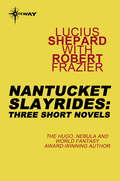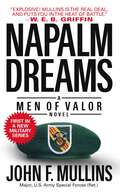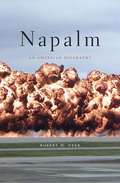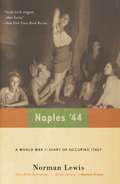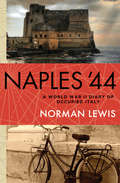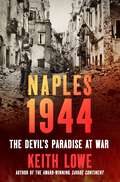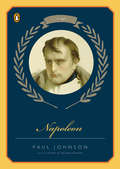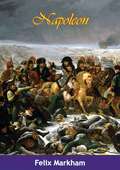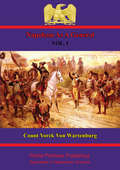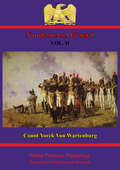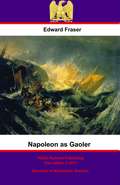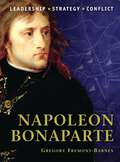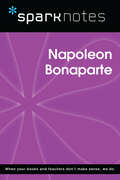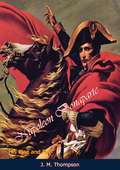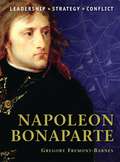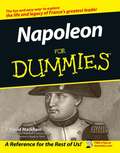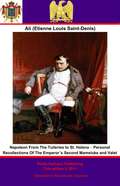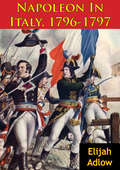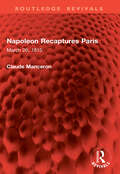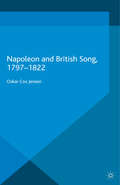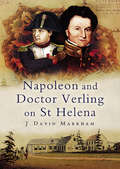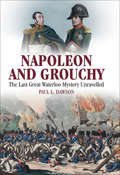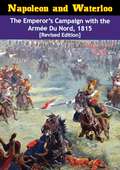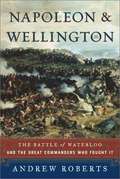- Table View
- List View
Nantucket Slayrides: Three Short Novels
by Lucius ShepardNantucket Slayrides contains the two short novels "How the Wind Spoke at Madaket" and "Nomans Land" by Shepard and Robert Frazier's "The Summer People".
Napalm Dreams: A Men of Valor Novel (Men of Valor #1)
by John F. MullinsA shattering novel of courage, heroism, and unbreakable bonds forged in the heat of battle. Green Beret Captain Finn McCulloden and his troops are having a very bad day -- even by the nightmarish standards of Vietnam. They've just been dropped into a meat grinder with orders to reinforce a Special Forces border camp that's about to be overrun by the North Vietnamese. Outnumbered twenty-to-one, beset by treachery from within, and saddled with an incompetent second-in-command, McCulloden knows that all hell is about to break loose. Through one brutal day and night McCulloden and his men fight alongside their native Montagnard allies in a pitched battle of blood and guts against an unwavering foe who never stops coming. The Green Berets can neither give up nor give in, and all will become heroes in the truest sense of the word. But one extraordinary soldier man rises above them all in an ultimate act of valor....
Napalm: An American Biography
by Robert M. NeerNapalm, incendiary gel that sticks to skin and burns to the bone, came into the world on Valentine's Day 1942 at a secret Harvard war research laboratory. On March 9, 1945, it created an inferno that killed over 87,500 people in Tokyo-more than died in the atomic explosions at Hiroshima or Nagasaki. It went on to incinerate sixty-four of Japan's largest cities. The Bomb got the press, but napalm did the work. After World War II, the incendiary held the line against communism in Greece and Korea-Napalm Day led the 1950 counter-attack from Inchon-and fought elsewhere under many flags. Americans generally applauded, until the Vietnam War. Today, napalm lives on as a pariah: a symbol of American cruelty and the misguided use of power, according to anti-war protesters in the 1960s and popular culture from Apocalypse Now to the punk band Napalm Death and British street artist Banksy. Its use by Serbia in 1994 and by the United States in Iraq in 2003 drew condemnation. United Nations delegates judged deployment against concentrations of civilians a war crime in 1980. After thirty-one years, America joined the global consensus, in 2011. Robert Neer has written the first history of napalm, from its inaugural test on the Harvard College soccer field, to a Marine Corps plan to attack Japan with millions of bats armed with tiny napalm time bombs, to the reflections of Phan Thi Kim Phuc, a girl who knew firsthand about its power and its morality.
Naples '44
by Norman LewisAs a young intelligence officer stationed in Naples following its liberation from Nazi forces, Norman Lewis recorded the lives of a proud and vibrant people forced to survive on prostitution, thievery, and a desperate belief in miracles and cures. The most popular of Lewis's twenty-seven books, Naples '44 is a landmark poetic study of the agony of wartime occupation and its ability to bring out the worst, and often the best, in human nature. In prose both heartrending and comic, Lewis describes an era of disillusionment, escapism, and hysteria in which the Allied occupiers mete out justice unfairly and fail to provide basic necessities to the populace while Neapolitan citizens accuse each other of being Nazi spies, women offer their bodies to the same Allied soldiers whose supplies they steal for sale on the black market, and angry young men organize militias to oppose "temporary" foreign rule. Yet over the chaotic din, Lewis sings intimately of the essential dignity of the Neapolitan people, whose traditions of civility, courage, and generosity of spirit shine through daily. This essential World War II book is as timely a read as ever.
Naples '44: A World War II Diary of Occupied Italy (Isis Large Print Ser.)
by Norman LewisThe classic memoir of the Italian city left in chaos by the Nazis is &“[a] masterpiece . . . elegiac and furious, and frequently hilarious&” (The New York Times). &“Vivid, lucid, elegant, often funny,&” Naples &’44 is the starkly human account of the true cost of war as seen through the eyes of a young, untested man who would never again look at his world the same way (The New York Times Book Review). With his gift for linguistics, Norman Lewis was assigned to the British Intelligence Corps&’ Field Security Service, tasked with reforming civil services, dealing with local leaders, and keeping the peace in places World War II had devastated. After a near-disastrous Allied landing at Salerno, Italy, Lewis was stationed in the newly liberated city of Naples. But bringing the city back to life was unlike anything he had been prepared for. Much of the populace was far from grateful, stealing anything they could, not only from each other but also from those sent to help them. Local vendettas and endless feuds made discerning friend from Nazi collaborator practically impossible, and turned attempts at meting out justice into a farce. And as the deprivations grew ever harsher, a proud and vibrant people were forced to survive on a diet of prostitution, corruption, and a desperate belief in miracles, cures, and saviors. But even through the darkness and chaos, Lewis evokes the essential dignity of the Neapolitan people, their traditions of civility, courage, and generosity of spirit, and the indefatigable pride that kept them fighting for life during the greatest calamity in human history. Praised by Graham Greene as &“one of the best writers . . . of our century,&” Norman Lewis presents a portrait of Naples that is a &“lyrical, ironic and detached account of the tempestuous, byzantine and opaque city in the aftermath of war&” (Will Self). His Naples &’44 &“reads like prose . . . sings like poetry&” (The Plain Dealer).
Naples 1944: The Devil's Paradise at War
by Keith LoweAward-winning author Keith Lowe's newest critical deep-dive into the history of Naples during WWII.Keith Lowe has chronicled the end of WWII in Europe in his award-winning book Savage Continent and the war’s aftermath in the sequel, The Fear and the Freedom. In Naples 1944, he brings readers another masterful chronicle of the terrible and often unexpected consequences of war. Even before the fall of Mussolini, Naples was a place of great contrasts filled with palaces and slums, beloved cuisine and widespread hunger. After the Allied liberation, these contrasts made the city instantly notorious. Compared to the starving population, Allied soldiers were staggeringly wealthy. For a packet of cigarettes, even the lowest ranks could buy themselves a watch, a new suit or a woman for the night. As the biggest port in Allied hands, Naples quickly became the center of Italy’s black market and has remained so ever since. Within just a few months the Camorra began to re-establish itself. Behind the chaos and the corruption, there was always the threat of violence. Army guns were looted and traded. Gangs of street kids fought running battles with the military police. Public buildings, booby-trapped by departing Germans, began to explode, seemingly spontaneously.Then in March 1944 - like an omen - Vesuvius erupted. Naples was the first major European city to be liberated by the Allies. What they found there would set a template for the whole of the rest of Europe in the years to come. Keith Lowe’s Naples 1944 is a page-turning book about a city on the brink of chaos and glimpse into the dark heart of postwar Italy.
Napoleon
by Paul JohnsonFrom New York Times bestselling author Paul Johnson, "a very readable and entertaining biography" (The Washington Post) about one of the most important figures in modern European history: Napoleon Bonaparte In an ideal pairing of author and subject, the magisterial historian Paul Johnson offers a vivid look at the life of the strategist, general, and dictator who conquered much of Europe. Following Napoleon from the barren island of Corsica to his early training in Paris, from his meteoric victories and military dictatorship to his exile and death, Johnson examines the origins of his ferocious ambition. In Napoleon's quest for power, Johnson sees a realist unfettered by patriotism or ideology. And he recognizes Bonaparte's violent legacy in the totalitarian regimes of the twentieth century. Napoleon is a magnificent work that bears witness to one individual's ability to work his will on history.
Napoleon (Mentor Ser.)
by Felix MarkhamNAPOLEON--SOLDIER, EMPEROR, LOVER...This magnificent reconstruction of Napoleon's life and legend is written by a distinguished Oxford scholar. It is based on newly discovered documents--including the personal letters of Marie-Louise and the decoded diaries of General Bertrand, who accompanied Napoleon to his final exile on St. Helena. It has been hailed as the most important single-volume work in Napoleonic literature."Mr. Markham's book is notable...a well-balanced study of a man vastly bigger than his 5 feet 6 inches, who has been for generations one of the most fascinating of subjects for biography."--Mark S. Watson, Baltimore Evening Sun"A surprisingly sympathetic biography of one of the most fascinating men who ever strutted across the stage of history."--Dolph Honicker, Nashville Tennesseean"A remarkable achievement. The story moves as fast as one of Bonaparte's campaigns and is told with the clarity of his dispatches."--The Economist"A definitive contribution to Napoleonic literature."--Jose Sanchez, St. Louis Globe Democrat"The university lecturer in History at Oxford has approached the impossible; he has written a new life of one of the most written-about figures in modern history with freshness, vivacity, fine scholarship and penetration."--James H. Powers, Boston Globe"Markham has achieved a startlingly vivid and coherent picture of Napoleon's career, of the social and intellectual influences that molded it, and of the men and forces that opposed it. The military events, the political movements, the personal intrigues--all appear, each in its proper place and perspective."--E. Nelson Hayes, Los Angeles Times"Markham's erudition is extensive; he makes full use of recent discoveries of manuscript material, and he writes with admirable judgment about a character who has been misjudged consistently by historians."--J. H. Plumb, The Saturday Review
Napoleon As A General. Vol. I (Napoleon As A General #1)
by Field Marshal Count Maximilian Yorck von Wartenburg Major Walter H. JamesA complete analysis of Napoleon Bonaparte as a general. Possibly the best analysis ever written, and the source book for many later works.There are many books about Napoleon, and some of them attempt to analyse his particular brand of military genius. Almost all these books owe a tremendous debt to Colonel Count Yorck von Wartenburg. His book was published at the end of the nineteenth Century and is still as important today; indeed, Dr David Chandler acknowledges that he used the book as one of the primary works when researching his momentous history of Napoleon. After a brief look at Napoleon's youth and early career Wartenburg sets out Napoleon's military exploits chronologically, beginning with the campaign in Italy, and the battles for Mantua. The first volume then describes the campaigns in Egypt and Syria before giving an account of the first of Napoleon's great battles: Marengo. Ulm, Austerlitz, Jena, Eylau and Friedland complete Volume I. Volume II covers Spain, Ratisbon, Wagram and the ill-fated invasion of Russia. After Moscow and the Beresina crossing came the armistice, and then Dresden and Leipzig. The book ends with the exile of Napoleon for the last time after his defeat at Waterloo. The writing is always clear and uncomplicated, suiting a description of twenty years in Europe which threw the political map into confusion, and had as legacy the mistrust between France and the remainder of the continent, and the growth of Prussian military might and British complacency in military matters.
Napoleon As A General. Vol. II (Napoleon As A General #2)
by Field Marshal Count Maximilian Yorck von Wartenburg Major Walter H. JamesA complete analysis of Napoleon Bonaparte as a general. Possibly the best analysis ever written, and the source book for many later works.There are many books about Napoleon, and some of them attempt to analyse his particular brand of military genius. Almost all these books owe a tremendous debt to Colonel Count Yorck von Wartenburg. His book was published at the end of the nineteenth Century and is still as important today; indeed, Dr David Chandler acknowledges that he used the book as one of the primary works when researching his momentous history of Napoleon. After a brief look at Napoleon's youth and early career Wartenburg sets out Napoleon's military exploits chronologically, beginning with the campaign in Italy, and the battles for Mantua. The first volume then describes the campaigns in Egypt and Syria before giving an account of the first of Napoleon's great battles: Marengo. Ulm, Austerlitz, Jena, Eylau and Friedland complete Volume I. Volume II covers Spain, Ratisbon, Wagram and the ill-fated invasion of Russia. After Moscow and the Beresina crossing came the armistice, and then Dresden and Leipzig. The book ends with the exile of Napoleon for the last time after his defeat at Waterloo. The writing is always clear and uncomplicated, suiting a description of twenty years in Europe which threw the political map into confusion, and had as legacy the mistrust between France and the remainder of the continent, and the growth of Prussian military might and British complacency in military matters.
Napoleon As Gaoler: Personal Experiences And Adventures Of British Sailors And Soldiers During The Great Captivity
by Edward FraserThe lot of a prisoner of war is well documented in more recent conflicts such as the Second World War, Korea, Vietnam and the Gulf conflicts, however the British prisoners of war during the Napoleonic period have received scant attention as whole. Edward Fraser, a noted author on the period set out to redress this balance in the literature of the period, offering a view of the trials, mistreatment and hardships of the British POWSDuring Napoleon's campaigns, along with canon, and standards innumerable, he captured the soldiers of the opposing powers in vast numbers, according to best estimates around half a million men fell into his hands. Of this number only a small fraction were in fact British, some twelve to sixteen thousand, this for two main reasons; that Britain never put into the field the numbers of the conscript armies such as Austria, Prussia and Russia, secondly they were never involved in such disastrous campaigns on the scale of Austerlitz, Jena, or the initial campaigns in Spain. Of the prisoners that were captured, either as crews mainly via shipwreck or during the 1809 Coruña campaign, their lot was hard enough, but was much better than the lot that befall the prisoners of Napoleon's continental enemies.However the tales of the British prisoners recall shootings, extortion, maltreatment and arbitrary punishments and are a powerful counterweight to the proposition of the supreme enlightenment of the French system. From the high rank of general Lord Blayney, captured in an abortive sortie on Fuengirola to the lowly Midshipman Edward Boyes, the British prisoner tell tales of their incarceration and abuse at the hands of various French authorities. In fairness the treatment of the more than one hundred thousand French prisoners in English hands was not a great deal better, as they were imprisoned on floating hulks.An excellent addition to the collection of Fraser's books on the Napoleonic Wars.Illustrations - 12
Napoleon Bonaparte
by Peter Dennis Gregory BarnesNapoleon Bonaparte is renowned as one of the great military commanders in history, and the central figure in so many of the events of the French Revolutionary and Napoleonic wars. Throughout the first decade of the 19th century he won battle after battle by wielding the Grande Arm�e decisively against the other powers of Europe - Prussia, Austria and Russia. Yet his fortunes changed in 1812 when the invasion of Russia wrecked his forces, and Napoleon suffered his final defeat at Waterloo in 1815.
Napoleon Bonaparte (SparkNotes Biography Guide)
by SparkNotesNapoleon Bonaparte (SparkNotes Biography Guide) Making the reading experience fun! SparkNotes Biography Guides examine the lives of historical luminaries, from Alexander the Great to Virginia Woolf. Each biography guide includes:An examination of the historical context in which the person lived A summary of the person&’s life and achievements A glossary of important terms, people, and events An in-depth look at the key epochs in the person&’s career Study questions and essay topics A review test Suggestions for further reading Whether you&’re a student of history or just a student cramming for a history exam, SparkNotes Biography guides are a reliable, thorough, and readable resource.
Napoleon Bonaparte: His Rise and Fall
by James Matthew ThompsonThe sum of Napoleonic literature is so immense that it might be wondered whether there is any need for a new Life of Napoleon. But there has been no important life in English since that by J. Holland Rose, first published in 1901, and last reprinted in 1934.It is hoped that there will be a welcome for a fresh attempt to summarize the history and access the importance of the period 1794-1815.J. M. Thompson’s book, Napoleon Bonaparte: His Rise and Fall, which was first published in 1951, is a sequel to his French Revolution, published in 1944. Its subject is the French people in its post-revolutionary mood, as interpreted and exploited by a foreigner who was at once a professional soldier and an administrative genius. The main source of information is Napoleon’s own correspondence, of which Mr. Thompson published a selection, translated as Letters of Napoleon, in 1934.In this present volume, J. M. Thompson has attempted to tell the story of the rise and fall of a dictator, whilst simplifying the historical background by dealing in turn with each of Napoleon’s main spheres of interest: Corsica, Italy, Egypt, Germany, Russia, England.
Napoleon Bonaparte: Leadership, Strategy, Conflict
by Gregory BarnesA short biography of Napoleon, who stands unrivaled in his position as history's foremost commander, a reputation justly earned in the course of nearly 20 years' campaigning in such diverse theatres of operation as Italy, Egypt, Spain, Germany, Poland, Russia and France. Taken together, his nearly 60 battles - some of them of far-reaching military and political significance - profoundly shaped the course of modern Europe, fundamentally changed the methodology of war and influenced the character and ambitions of a man whose mind and method continue to fascinate students and scholars today. This is a military account of Napoleon's martial career, examining the tactics and leadership skills he displayed and including in-depth assessments of his role at Austerlitz, Borodino and Waterloo, the three battles that were to shape his destiny.
Napoleon For Dummies
by J. David MarkhamExplains his influence on the military, law, politics, and religionGet the real story of Napoleon BonaparteNot sure what's true about Napoleon? This easy-to-follow guide gets past the stereotypes and introduces you to this extraordinary man's beginnings, accomplishments, and famous romances. It traces Napoleon's rise from Corsican military cadet to Emperor of the French, chronicles his military campaigns, explains the mistakes that led to his removal from power, and explores his lasting impact on Europe and the world.Discover* How Napoleon built -- and lost -- an empire* The forces that influenced him* Why he created the Napoleonic Code* The inside story on Josephine* How he helped shape modern-day Europe
Napoleon From The Tuileries to St. Helena: Personal Recollections Of The Emperor’s Second Mameluke and Valet
by Etienne Louis Saint-Denis Prof. G Michaut Frank Hunter PotterThis ebook is purpose built and is proof-read and re-type set from the original to provide an outstanding experience of reflowing text for an ebook reader. Following the abortive campaign in Egypt, Napoleon collected a number of men from the Mamelukes to serve in his household and a further number in his Imperial Guard. They held positions of great esteem and closeness to the Emperor's person, and as time went on the title of Mameluke denoted the position in the household, rather than the origin of the person. The man known as Ali the Mameluke was actually a Frenchman born at Versailles, son of a member of the Bourbon household staff. He was attached to the household of the Emperor on the recommendation of the Master of Horse, Armand de Caulaincourt. The memoirs that he left behind him are a close and balanced portrait of Napoleon during the last years of his reign, the Hundred Days, and finally his imprisonment on St. Helena. Ali's memoirs are free from the overly gossipy tone of those left by Constant and are more accurate and penetrating than those of Roustam. He studiously avoids entering into the details that he did not personally view. Although he is a staunch Bonapartist, overall, there is not too much bias. He freely shows the stresses and strains of Napoleon carrying out his plans in grandeur, and then in ignominious surroundings at Longwood. All of the luminaries of the last days of the Empire pass before Ali's eyes and therefore his pen, and he is not always flattering about them. An important memoir of an intimate member of Napoleon's household. Author - Etienne Louis Saint-Denis (known as Ali) (1788-1856) Foreword - Professor G Michaut of the Sorbonne (????-????) Translator - Frank Hunter Potter (1851-1932) Text taken, whole and complete, from the edition published in 1922, New York, by Harper & brothers Original - 360 pages. Illustrations- 7 Illustrations, and three maps, all included Linked TOC
Napoleon In Italy, 1796-1797
by Lt.-Col. Elijah AdlowIncludes 26 maps.The story of Napoleon's brilliant first campaign in Italy is here expertly recounted by Elijah Adlow, former Lieutenant Colonel in the US 26th Infantry Division."Of the many campaigns in which Napoleon participated, that in which he first exercised independent command is rich in example. In the Italian Campaign of 1796 we discover in amazing sequence those basic combinations upon which rests the structure of the art of war. What is more, the contrasting talents of the opposing commanders enable us to discover the part which spiritual as well as physical factors play in the process of war.Aside from the brilliant successes which gave him fame, Napoleon must always appeal to students of warfare because of the distinct quality of simplicity which marked all his operations. He had the talent for making himself strategically and tactically articulate. To the young soldier who seeks to discover the secret of an art whose mysteries have been revealed to but few, there is some compensation in being able to identify objectively those elements which determine the outcome of military events. If this presentation has aided in the process, its purpose will have been fulfilled."-Author's Preface.
Napoleon Recaptures Paris: March 20, 1815 (Routledge Revivals)
by Claude ManceronParis, March 19, 1815; midnight. A line of heavy carriages draws up in the courtyard of the Tuilleries, while a crowd of despairing royalists watch the departure of Louis XVIII. Within 24 hours, amid indescribable enthusiasm, Napoleon was taken from his carriage and borne in triumph to his study. The vanquished man of Fontainebleau, the exile of Elba, had recaptured Paris at the head of the troops whom the King had sent to fight him. ‘Have you ever seen a man reconquer his throne merely by showing his hat? It’s the greatest of God’s miracles’, said Balzac’s grenadier. But how was this Revolution of March 20 achieved, and why? —a revolution which, but for Waterloo, might have given a new start to the European revolution? Hour by hour, in the Emperor’s army and at the Royal palace, on Napolean’s road and in the streets, we can through the pages of Napoleon Recaptures Paris (first published in English in 1968) relive and understand every moment of one of the strangest days in history and of the week that led up to it.Claude Manceron spent many years researching the documentation of the 100 days, and here produced a valuable book. It is a must read for students and researchers of French history. The book will also appeal to general readers.
Napoleon and British Song, 1797-1822 (War, Culture and Society, 1750 –1850)
by Oskar Cox JensenThis study offers a radical reassessment of a crucial period of political and cultural history. By looking at some 400 songs, many of which are made available to hear, and at their writers, singers, and audiences, it questions both our relationship with song, and ordinary Britons' relationship with Napoleon, the war, and the idea of Britain itself.
Napoleon and Doctor Verling on St Helena
by J. David MarkhamMany books have been written about St Helena and its most famous resident, the exiled Emperor Napoleon Bonaparte. The episode has been so intensively researched that it is rare for a fresh, unpublished account to come to light. Yet Dr James Verling's St Helena journal is just such a source. Verling was based on St Helena during Napoleon's imprisonment and he was even appointed as Napoleon's official physician. Throughout his stay, this young doctor kept a vivid diary of his experiences. Through Verling's eyes we get a fresh view of daily life on the island and of the suspicion-filled society that grew up around Napoleon during his last years.
Napoleon and Grouchy: The Last Great Waterloo Mystery Unravelled
by Paul L. DawsonOne of the enduring controversies of the Waterloo campaign is the conduct of Marshal Grouchy. Given command of a third of Napoleons army and told to keep the Prussians from joining forces with Wellington, he failed to keep Wellington and Blcher apart with the result that Napoleon was overwhelmed at Waterloo. Grouchy, though, was not defeated. He kept his force together and retreated in good order back to France.Many have accused Grouchy of intentionally holding back his men and not marching to join Napoleon when the sound of the gunfire at Waterloo could clearly be heard, and he has been widely blamed for Napoleons defeat.Now, for the first time, Grouchys conduct during the Waterloo campaign is analyzed in fine detail, drawing principally on French sources not previously available in English. The author, for example, answers questions such as whether key orders did actually exist in 1815 or were they later fabrications to make Grouchy the scapegoat for Napoleons failures? Did General Grard really tell Grouchy to march to the sound of the guns? Why did Grouchy appear to move so slowly when speed was essential?This is a subject which is generally overlooked by British historians, who tend to concentrate on the actions of Wellington and Napoleon, and which French historians choose not to look at too closely for fear that it might reflect badly upon their hero Napoleon.Despite the mass of books written on Waterloo, this is a genuinely unique contribution to this most famous campaign. This book is certain to fuel debate and prompt historians to reconsider the events of June 1815.
Napoleon and Waterloo: The Emperor’s Campaign with the Armée Du Nord, 1815 [Revised Edition]
by Major A. F. BeckeThis is the 1936 revised edition of the 1914 two-volume account of Napoleon's last campaign by Britain's pre-eminent military historian of the early 20th century, now combined in one handy single volume.This first part takes the story of the Hundred Days from the Emperor s return from exile in Elba up to his despatch of the incompetent Marshal Grouchy to head off the Prussians while he faced Wellington at Waterloo. The book looks at Napoleon's strategy and tactics as well as his disposition of his Armée du Nord and the battles of Quatre Bras and Ligny.The second part looks at the climactic confrontation between Napoleon and Wellington at Waterloo itself and has a number of appendices relating to the great battle, including orders of battle of the French, British, Dutch and Prussian forces engaged and correspondence between Napoleon and Marshals Soult, Davout, Ney and Grouchy.Contains 11 maps (including 6 new maps).A must for anyone interested in the Napoleonic wars, and the single volume should make it easier for both the general reader and the student to follow the campaign in its entirety.
Napoleon and Wellington - The Battle of Waterloo and the Great Commanders Who Fought It
by Andrew RobertsThe battle of Waterloo is examined via a study of the relationship and interactions between the opposing commanders, Napoleon Bonaparte and the Duke of Wellington.
